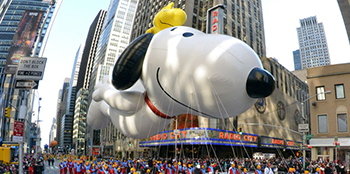(单词翻译:单击)

The news came like a blindside burst of machine gun fire from the evil Red Baron: Snoopy, the *plucky *beagle and a star of the Peanuts comic strip, has been shot down: Insurance giant MetLife has eliminated Snoopy as its advertising mascot.
这则消息就像邪恶的红男爵突射机关枪一样出其不意:史努比,那个勇敢的小猎犬,同时也是连载动漫《花生》中的明星被“击落”了——保险业巨头大都会人寿不再使用史努比作为广告吉祥物。
“We brought in Snoopy over 30 years ago to make our company more friendly and *approachable during a time when insurance companies were seen as cold and distant,” says Esther Lee, MetLife’s global chief marketing officer.
大都会人寿全球首席营销官艾斯特.李表示:“30多年前,我们引入史努比,是想在一个保险公司被视作冷酷无情的时期,使我们的公司看起来更加友善和亲切。”
And now, the giant insurer is seen as ...warm and *fuzzy?
那现在呢,这个保险业巨头就看起来……温暖可亲了吗?
We don’t think so. Certainly not after *strafing Snoopy.
我们不这样认为,尤其是史努比被“打入冷宫”后。
Nevertheless, we won’t second guess MetLife. The company is launching a new global branding effort and plans to focus more on corporate clients. So Snoopy *spirals to the ground.
尽管如此,我们不会去事后评价大都会人寿。这家公司正在启动新的全球品牌化策略,希望更关注企业客户。所以史努比就被“扫地出门”了。
In the ad world, this is business as usual. Heck, in any business this is the way things work.
在广告世界里,这是再正常不过的事。而且说到底,这也是任何一个行业的运行之道。
You produce desired results or, in Snoopy’s case, you wind up in the doghouse. MetLife found that while people considered the Peanuts gang friendly and approachable, the cartoon characters didn’t summon images of leadership and responsibility, The New York Times reports. Snoopy, with his vivid fantasy life as a World War I pilot, didn’t resonate in the way that MetLife would hope: In other words, Snoopy apparently didn’t chase consumers into insurance offices.
你要么得以实现你想要的结果,要么,在史努比的案例中…最后进了狗窝。据《纽约时报》报道,大都会人寿发现,尽管人们认为《花生》漫画里的人物是友好的、平易近人的,这些卡通人物并不能唤起一种领导感和责任感。史努比和它在第一次世界大战王牌飞行员生动的奇幻生活,无法与大都会人寿所期望的形象产生共鸣:换句话说,史努比显然没有驱使消费者参与到保险业务中去。
So Snoopy takes his place in the unemployment line with other famous-brand mascots of yesteryear–obsolete characters such as Bucky Beaver of Ipana toothpaste fame.
因此,史努比就加入到了昔日风光无限的品牌吉祥物的失业队伍中——那些已遭淘汰的形象,比如Ipana牙膏的巴奇海狸。
We *shudder to think who could be next. There are so many icons peering out from cereal boxes, *detergents and other household staples.
我们不禁要打一个冷颤,想想谁会成为下一个呢?还有很多卡通形象正从麦片盒、洗涤剂和其他家庭生活用品的包装上瞟眼看着呢。
Some characters, of course, have second acts. For instance: Hipster Charlie the Tuna, forever disappointed that he wouldn’t be allowed in a StarKist tuna can. “Sorry, Charlie. StarKist doesn’t want tunas with good taste; StarKist wants tunas that taste good.” After a deep-sea hiatus, Charlie came out of retirement in 1999 and thrives again.
当然,也有一些卡通形象迎来了“第二春”。比如,嬉皮士金枪鱼查理永远都对自己无法出现在星基斯特(StarKist)金枪鱼罐头包装上感到失望。“抱歉了,查理。星基斯特不想要品味不错的金枪鱼;星基斯特想要味道不错的金枪鱼。”在经历了一段“深海退休生活”后,查理在1999年复出,并一直活跃至今。
The problem isn’t always flagging sales or a character out of tune with the times. McDonald’s announced recently that it has temporarily sidelined Ronald, after a series of so-called “creepy clown” sightings across the country.
问题也不总是与下滑的销量或过时的形象有关。麦当劳近期就宣布,在最近发生了一系列席卷全国的所谓“小丑恐慌”后,他们暂时把麦当劳叔叔收了起来。
Question: If Ronald stays disappeared, will enough people care? We may find out.
问题是:如果麦当劳叔叔永远消失,会有更多人在意吗?我们可以拭目以待。
When you stroll down the grocery aisle, glance at the faces peering out from bottles, cans and cartons: Aunt Jemima. The Pillsbury Doughboy. Elsie the Cow. The Brawny Lumberjack. Tip your hat to them and all the others. They’ve survived generation after generation, thanks to you.
当你在货架前闲逛时,留意一下那些从玻璃瓶、罐头盒和纸盒上出现的面孔:杰迈玛阿姨、面团宝宝、奶牛埃尔希和强壮伐木工。请向他们以及其他形象致敬吧。托你的福,他们得以一代代地幸存下来。


